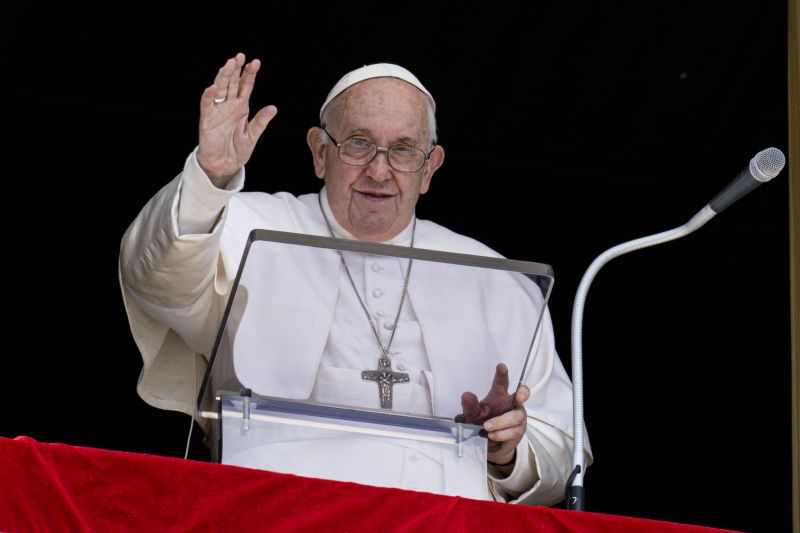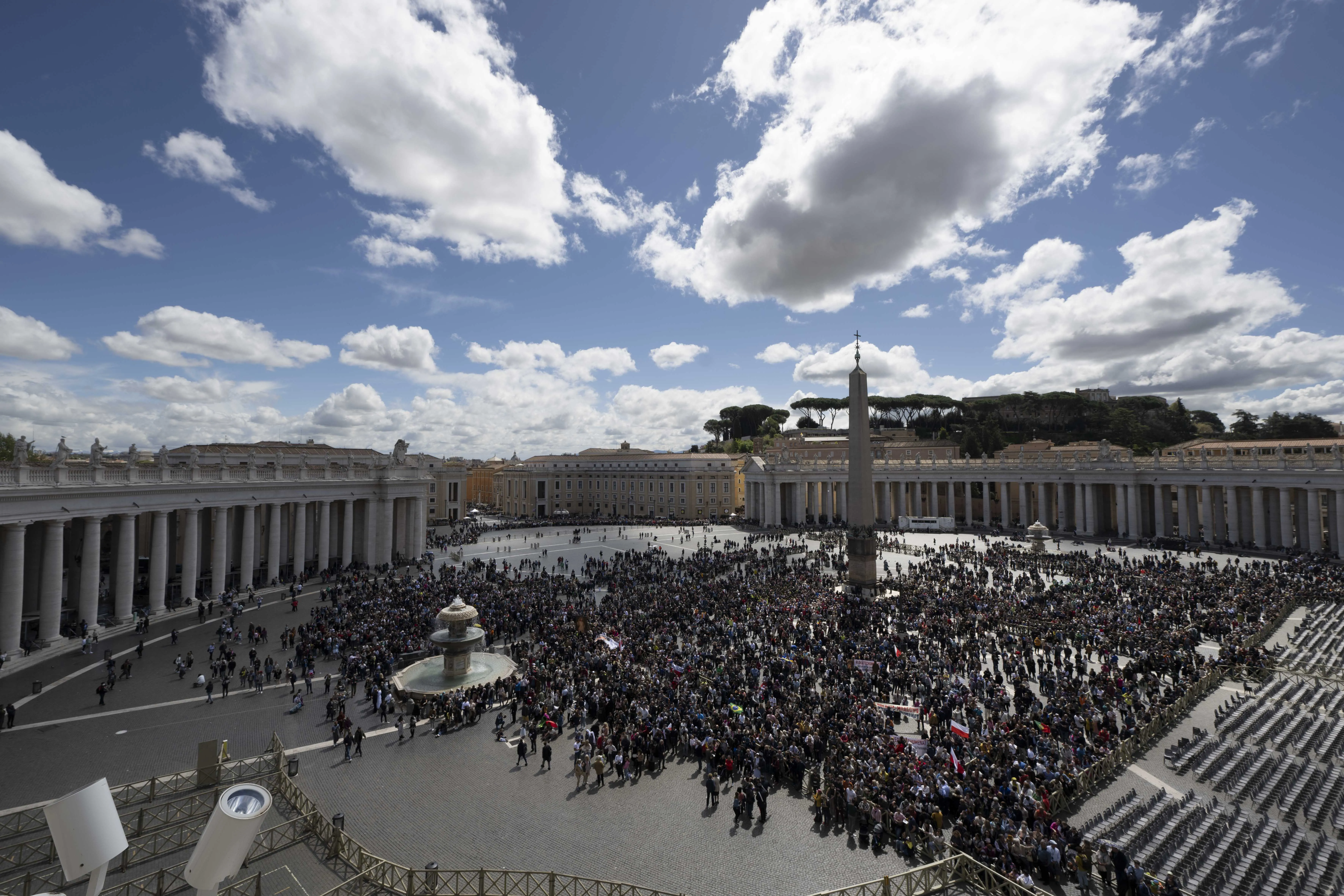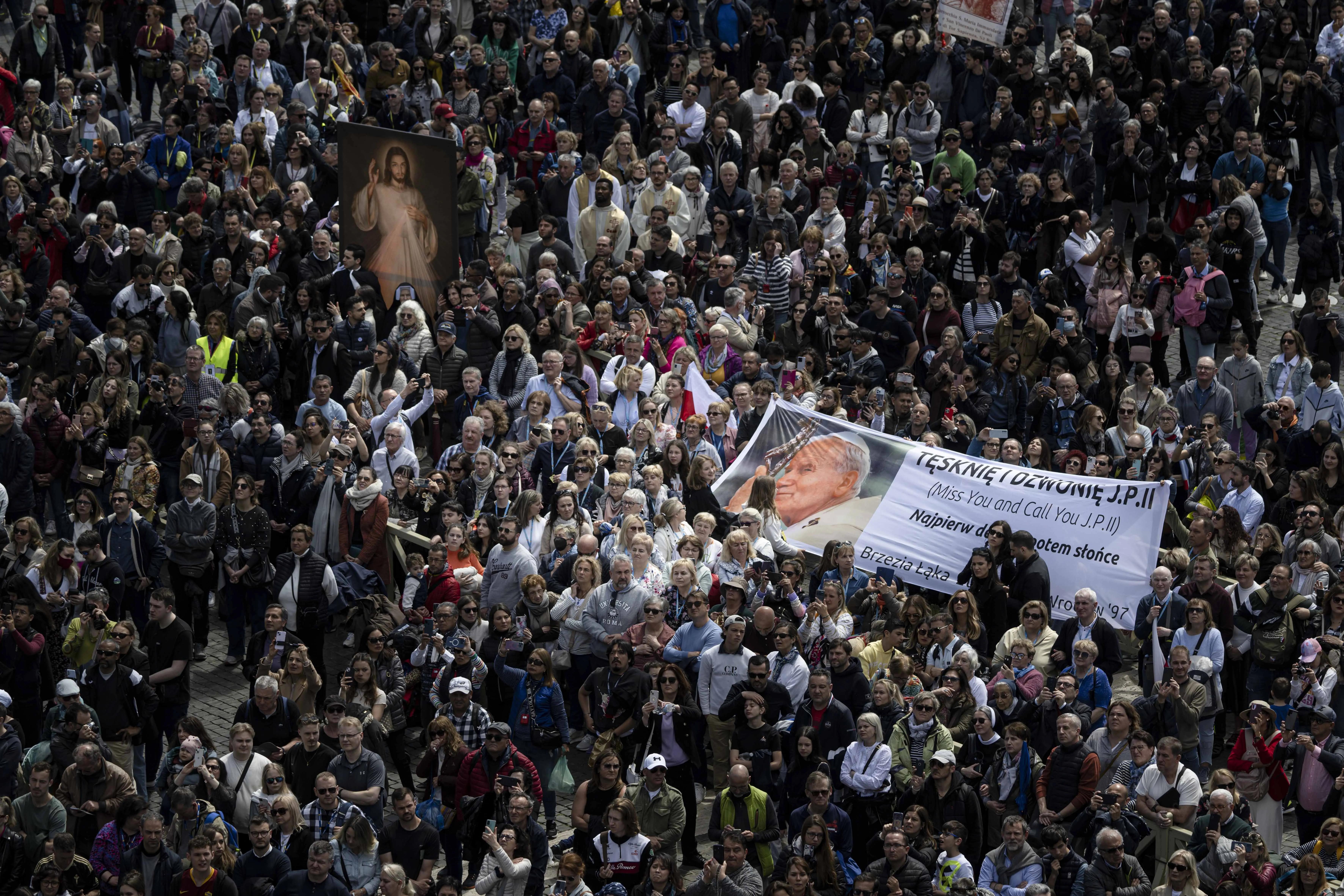
Vatican City, Apr 16, 2023 / 07:00 am (CNA).
Despite its failures and imperfection, within the community of the Church is where one finds Jesus, Pope Francis said on Divine Mercy Sunday.
Reflecting on St. Thomas the Apostle’s initial doubt in Christ’s resurrection, Francis asked: “Where do we seek the Risen One? In some special event, in some spectacular or amazing religious manifestation, solely at the emotional or sensational level? Or rather in the community, in the Church, accepting the challenge of staying there, even though it is not perfect?”
“Without the community,” he emphasized, “it is difficult to find Jesus.”
The pope spoke about doubt and the Church to an estimated 20,000 people gathered in St. Peter’s Square April 16. On Sundays during the Easter Season, in place of the Angelus he prays the Regina Caeli, a Latin antiphon honoring the Virgin Mary.

In his brief message before the prayer, Francis explained how Jesus’ invitation to touch his wounds is not only for the “doubting apostle,” but for us too.
“In reality, Thomas is not the only one who struggled to believe. In fact, he represents all of us a little bit,” he said.
He noted that Jesus chose to appear to St. Thomas when he was with the community of the other disciples in the Upper Room, not when he was alone.
“Thomas wants an extraordinary sign — to touch the wounds. Jesus shows them to him, but in an ordinary way, coming in front of everyone, in the community, not outside,” the pope said.
“Despite all of its limitations and failures, which are our limitations and failings, our Mother Church is the Body of Christ,” he underlined. “And it is there, in the Body of Christ, that, now and forever, the greatest signs of his love can be found impressed.”
Pope Francis recalled that when Jesus first appeared to his disciples in the Upper Room after his death and resurrection, Thomas was not present.
“While the others had closed themselves inside the Upper Room out of fear, he went out, running the risk that someone might recognize, report and arrest him,” he said.
We might, he said, think that Thomas, due to his courage, was even more deserving to have had the Risen Lord appear to him on his own.

“Instead, precisely because he had been away, Thomas was not there when Jesus had appeared the first time to the disciples on Easter evening,” Francis explained, “thus losing that opportunity. He had gone away from the community. How could he retrieve the opportunity? Only by going back with the others, returning to that family he had left behind, scared and sad.”
When Thomas does return, he struggles to believe what the other disciples tell him. He wants to see Jesus’ wounds with his own eyes, the pope recounted.
“And,” Pope Francis added, “Jesus satisfies him: eight days later, he appears again in the midst of his disciples and shows them his wounds, his hands, his feet, these wounds that are the proof of his love, that are the ever-open channels of his mercy.”
The pope said the Risen Lord’s choice to appear to the disciples as a community was a message that is also relevant to us today.
“It’s as if he said to [Thomas]: if you want to meet me, do not look far away, remain in the community, with the others. Don’t go away, pray with them, break bread with them,” he said. “And he says this to us as well.”
“That is where you will find me; that is where I will show you the signs of the wounds impressed on my body: the signs of the love that overcomes hatred, of the pardon that disarms revenge, the signs of the life that conquers death,” he continued.
“It is there, in the community, that you will discover my face, as you share moments of doubt and fear with your brothers and sisters, clinging even more strongly to them.”
Pope Francis encouraged Catholics to ask themselves if in the name of Jesus’ wounds, they are willing to open their arms to others, especially the wounded, so that no one is excluded from God’s mercy.
“May Mary, the Mother of Mercy, help us to love the Church and to make her a welcoming home for everyone,” he said.
If you value the news and views Catholic World Report provides, please consider donating to support our efforts. Your contribution will help us continue to make CWR available to all readers worldwide for free, without a subscription. Thank you for your generosity!
Click here for more information on donating to CWR. Click here to sign up for our newsletter.




We read: “Without the community…it is difficult to find Jesus.”
Yes, and in addition, the Eucharistic community of the Church is first founded and found in Jesus Christ, as if Pentecost also happened with the apostles and their successors. The Eucharistic Doxology recited by the sacramentally ordained: “Through Him, and with Him, and in Him, O God, almighty Father, in the unity of the Holy Spirit, all glory and honor is yours, forever and ever. Amen.”
“Pope Francis encouraged Catholics to ask themselves if in the name of Jesus’ wounds, they are willing to open their arms to others, especially the wounded, so that no one is excluded from God’s mercy.”
“’May Mary, the Mother of Mercy, help us to love the Church and to make her a welcoming home for everyone,’ he said.”
We are getting used to our pope’s well-worked methodology of lulling us with some unexceptional Christian truths and then slipping in the sting-in-the-tail: the poison of his heretical urgings for syncretistic, unitarian, universalism.
Heretically, this pope is implying that it was UNMERCIFUL for Jesus & His Apostle to teach against sin & immorality, and to reject obdurately unrepentant sinners & those who promote immorality.
Francis & Co are straining might-&-main to urge us to ‘mercifully’ incorporate into our Catholic communities those who despise & disregard God’s instructions.
Since it is God who manifestly excludes such, it is sacrilegious to suggest we are not merciful in excluding unrepentant sinners from the Precious Flesh & Blood of Jesus Christ.
Where did Jorge Bergoglio’s R.E. teachers fail in not having him grasp that the God & Father of our Lord Jesus Christ & source of The Holy Spirit is a PARTICULARIST, never a universalist.
Out of a multitude, Jesus Christ never welcomed any unrepentant sinner. Not one!
God does not change: “Repent and believe The Gospel!” stands firm forever.
Acts 3:19 tells us that from the start Peter, the first pope, urged those who wanted to be in the Church: “Now you must repent and turn to God so that your sins may be wiped out”.
Apostle Paul is equally emphatic: “I will make My home among you and live with you; I will be your God & you shall be My people. Then come away from them and keep aloof, says the Lord. Touch nothing that is unclean, and I will welcome you and be your Father, and you shall be My sons & daughters, says The Almighty Lord.” 2 Corinthians 6:16-18.
In urging universalism, the current pope defies God. If we actually do what Francis & his collaborators are urging, the result will be that God will refuse to be part of us. Catholicism will be a Christless, Holy Spiritless organization, naked & vulnerable before the ruthless spirit of this world.
The ‘Church That Jorge Made’ will look much the same: same buildings, same clergy, same liturgies; routine as usual – “What was all that fuss about?”
Yet, like Herod’s Temple, rendered Godless when Christ was crucified, then destroyed. So with hubristic Jorge’s Godless Catholic Church, nemesis will be just around the corner. Those who say we’re secured by divine promise need to read the history of Israel. God has been and still is willing to utterly destroy and rebuild according to His will. A respectful fear of The Lord is still the beginning of wisdom.
We can be sure that Francis’ appeal to our Most Blessed Mother Mary (“the mother of mercy”) is futile. The Beloved Apostle John tells us that the children who are acceptable to our Most Blessed Mother Mary have 3 characteristics: 1. They obey God’s commandments; 2. They bravely witness to the Gospel of her Son, Jesus Christ; 3. They are persecuted by the same spirit of this world who persecuted Mary. Revelation 12:17b.
Dear Pope Francis: just imagine how offensive it is for you to ask our Most Blessed Mother Mary to pray for the Catholic Church to incorporate those who disobey God’s commandments and those who serve the spirit of this world, who persecutes all true Catholic Christians.
PLEASE wake up, Pappa, to who you are really serving!
Always in the grace & mercy of Jesus Christ; love & blessings from marty
Truth, courage and love for God’s word makes for strong churchmen. Thank you my brother for your example.
Thanks, dear Brother Brian.
Theologian, Dr John M. Grondelski provides an excellent view of what ‘welcoming’ meant and still should mean.
https://www.newoxfordreview.org/how-the-church-used-to-welcome-people/
Alas, computer problems prevent hooking up with the link you provided. Thank you for providing it all the same.
Blessings as you honour our saviour and serve His flock with knowledge and truth.
Scientists doubt. Thomas was blessed with a scientific mind. He was the forerunner of all scientists worth the name. In the end Thomas was mightily rewarded for his courage to take risks. Doubting Thomas had a memorable encounter with the Lord. What an encounter it must have been!